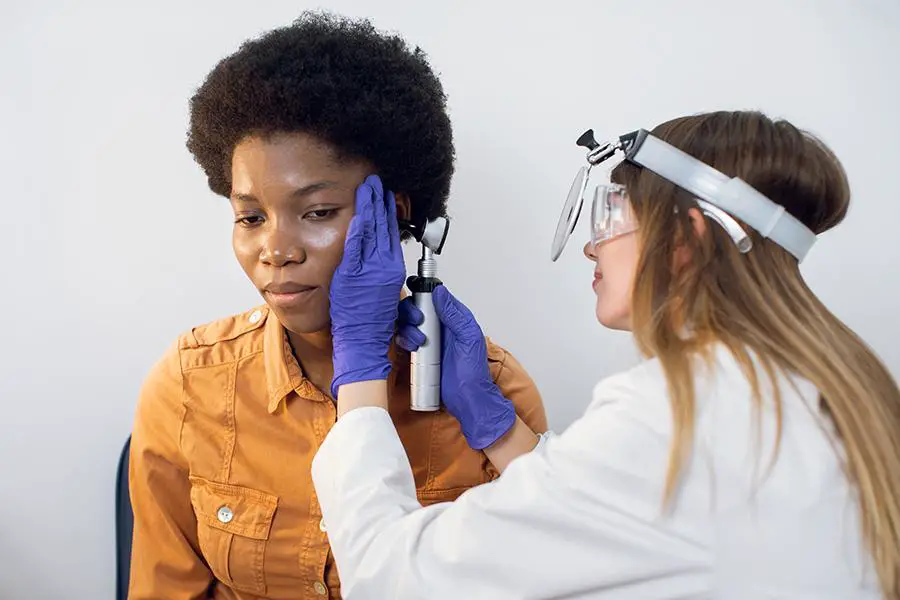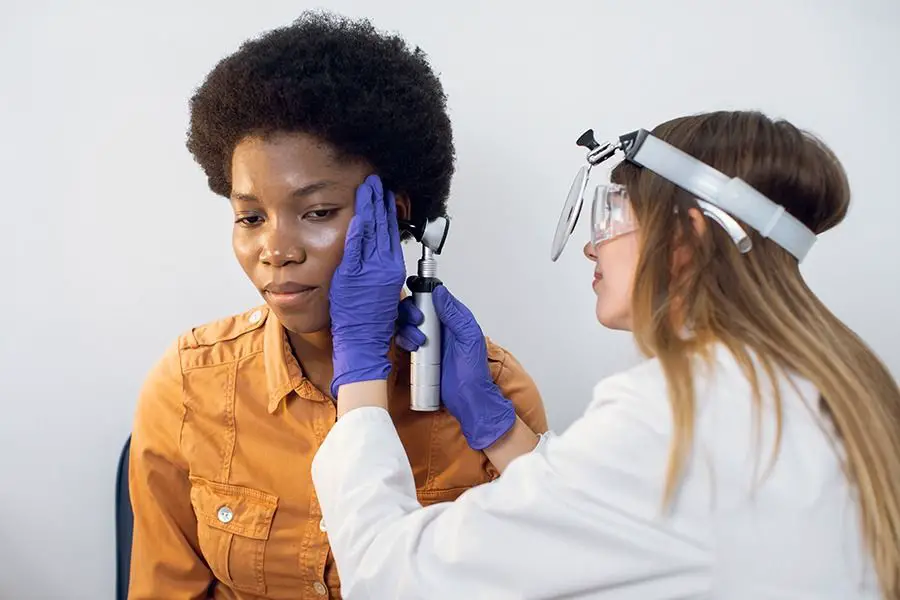Introduction
Meningitis is a serious infection that causes inflammation of the protective membranes of the brain and spinal cord. It can be caused by bacteria, viruses, fungi, or parasites, but bacterial meningitis is the most common and dangerous type. One of the most severe complications of bacterial meningitis is hearing loss, which can affect up to 50% of people who survive the infection. Hearing loss can occur within weeks or months after meningitis and is usually permanent. It can range from mild to profound and affect one or both ears.
Hearing loss can have a significant impact on the quality of life of people who have had meningitis. It can affect their communication, education, work, social interactions, and mental health. However, there are ways to cope with hearing loss and access support and rehabilitation services that can help them overcome the challenges they face. In this blog post, we will explore some of the topics related to hearing loss after meningitis, such as:
• Psychological impact of meningitis-related hearing loss and coping strategies
• Support networks and organizations for meningitis survivors with hearing loss
• Educational resources for individuals with meningitis-induced hearing loss
• Workplace accommodations for professionals with meningitis-related hearing loss
• Empowering meningitis patients: strategies for self-advocacy and independence
Tweak Digital Hearing Amplifier
Experience the epitome of sophisticated sound with Tweak, the revolutionary device that brings a new dimension to your auditory experience. Harnessing the power of innovative patented technology, Tweak offers you the freedom to fine-tune your hearing with a diverse range of amplification options. Whether you prefer a subtle enhancement or a more pronounced boost, Tweak empowers you to effortlessly customize your acoustic world.
Crafted with meticulous care and expertise, Tweak represents the brilliant collaboration between an esteemed audiologist and a team of dedicated acoustic engineers. Their collective passion for impeccable sound quality shines through in every detail of this remarkable device. Designed to elevate your hearing capabilities across any environment, Tweak utilizes cutting-edge technology to ensure that you can fully engage with the sounds that matter most to you.
Unlock the extraordinary potential of affordable sound quality with Tweak. By leveraging the latest advancements in digital technology, this ingenious device delivers an auditory experience that rivals that of prescription hearing aids. With premium-grade components at its core, Tweak offers you uncompromising performance without breaking the bank. Immerse yourself in a world of enhanced sound, where clarity and richness seamlessly merge to create an exceptional listening experience.
Psychological Impact of Meningitis-Related Hearing Loss and Coping Strategies
Hearing loss after meningitis can be a traumatic experience that can trigger a range of emotions, such as shock, anger, grief, denial, guilt, anxiety, depression, and isolation. These feelings are normal and understandable, but they can also interfere with the recovery process and the adjustment to hearing loss. Therefore, it is important to seek professional help if these emotions become overwhelming or persistent.
Some of the coping strategies that can help people with meningitis-related hearing loss include:
• Accepting the hearing loss and acknowledging its impact on their lives
• Seeking information and education about hearing loss and its management
• Exploring different options for hearing devices, such as hearing aids or cochlear implants
• Learning new skills, such as lipreading, sign language, or speech therapy
• Communicating their needs and preferences to their family, friends, health care providers, teachers, or employers
• Joining support groups or online communities where they can share their experiences and feelings with others who have been through similar situations
• Engaging in hobbies and activities that bring them joy and satisfaction
• Practicing self-care and stress management techniques, such as meditation, exercise, or relaxation
Support Networks and Organizations for Meningitis Survivors with Hearing Loss
One of the best ways to cope with hearing loss after meningitis is to connect with other people who have gone through the same ordeal. There are many support networks and organizations that offer information, advice, advocacy, peer support, financial assistance, and other services for people who have had meningitis and their families. Some of these organizations are:
• Meningitis Now: A UK-based charity that provides emotional and practical support for people affected by meningitis. They offer a free helpline (0808 80 10 388), a peer support network (Befrienders), a counselling service (Rebuilding Futures), a financial support scheme (Believe & Achieve), a young ambassadors program (Young Futures), and various events and campaigns to raise awareness and funds for meningitis research.
• Meningitis Research Foundation: A UK-based charity that funds research into the prevention, detection, and treatment of meningitis. They also provide information and resources for people affected by meningitis,
such as a helpline, a befriending service, a counselling service, a financial support scheme, and a young ambassadors program. They also have a factsheet on hearing loss and tinnitus after meningitis.
• Meningitis Research Foundation: A UK-based charity that funds research into the prevention, detection, and treatment of meningitis. They also provide information and resources for people affected by meningitis, such as a helpline, a membership scheme, a peer support network, and various publications and events. They also have a factsheet on deafness after meningitis.
• The National Deaf Children’s Society: A UK-based charity that supports deaf children and their families. They offer a range of services, such as a helpline, an online community, a family support service, an advocacy service, an education service, and various events and activities. They also have a booklet on meningitis and childhood deafness.
• Hearing Link: A UK-based charity that helps people with hearing loss to reconnect with their family, friends, and community. They offer information and advice, peer support groups, online forums, personal support programmes, and training courses.
• Action on Hearing Loss: A UK-based charity that supports people with hearing loss and tinnitus. They offer information and resources, hearing aids and equipment, communication services, community support services, campaigns and research.
Educational Resources for Individuals with Meningitis-Induced Hearing Loss
Hearing loss can affect the educational development and achievement of children and young people who have had meningitis. They may face difficulties with listening, speaking, reading, writing, socializing, and self-esteem. However, with appropriate support and intervention, they can overcome these challenges and reach their full potential.
Some of the educational resources for individuals with meningitis-induced hearing loss include:
• Early intervention services: These are services that provide assessment, diagnosis, treatment, and support for children with hearing loss from birth to age five. They may include audiologists, speech-language therapists, teachers of the deaf, educational psychologists, social workers, and other professionals. They can help children develop their language, communication, cognitive, and social skills through individualized plans and programs.
• Special educational needs (SEN) support: This is support that is provided by schools for children with hearing loss who have difficulties with learning or accessing the curriculum. It may include extra help in class,adapted materials, assistive technology, specialist teachers, or additional support staff. It may also include an education, health and care (EHC) plan that sets out the child’s needs and the support they require.
• Further and higher education support: This is support that is provided by colleges and universities for students with hearing loss who are pursuing further or higher education. It may include disability advisers, note takers, interpreters, mentors, tutors, or learning support assistants. It may also include funding from the Disabled Students’ Allowance (DSA) that can help cover the costs of equipment, travel, or other expenses related to hearing loss.
• Online learning resources: These are resources that are available on the internet for people with hearing loss who want to learn new skills or improve their knowledge. They may include websites, videos, podcasts, apps, or courses that are accessible, engaging, and informative. Some examples are:
• Hearing Link: A website that offers information and advice on various topics related to hearing loss, such as communication, technology, health, travel, work, and education.
• Auditory Verbal UK: A website that offers online courses and webinars for parents and professionals who want to learn more about auditory verbal therapy for children with hearing loss.
• The Elizabeth Foundation: A website that offers online courses and resources for parents and professionals who want to learn more about supporting the development of deaf children.
• Action on Hearing Loss: A website that offers online courses and resources for people with hearing loss who want to learn more about managing their hearing loss, improving their communication skills, or finding employment.
SUDDEN HEARING LOSS – SYMPTOMS, CAUSES AND TREATMENTS
Workplace Accommodations for Professionals with Meningitis-Related Hearing Loss
Hearing loss can affect the professional performance and career prospects of people who have had meningitis. They may face difficulties with communication, collaboration, productivity, confidence, and well-being at work. However, with appropriate accommodations and support, they can overcome these challenges and succeed in their chosen fields.
Some of the workplace accommodations for professionals with meningitis-related hearing loss include:
• A desk in a quieter area
• Assistive listening devices or systems for meetings, conferences, and presentations
• A desk phone that’s hearing-aid compatible or, if needed, a captioned telephone service
• A smartphone (if supplied by the employer) that’s hearing-aid compatible or that allows installing apps for easier phone calls
• Written meeting agendas, meeting notes, memos, and work assignments
• Flexible working hours or arrangements
• Access to counselling or mentoring services
• Training and awareness sessions for colleagues and managers
These accommodations can be requested under the Equality Act 2010 in the UK or the Americans with Disabilities Act (ADA) in the US. These laws protect people with disabilities from discrimination and require employers to provide reasonable adjustments to enable them to perform their jobs effectively.
Hearing care professionals offering the Roger portfolio can help apply for reimbursement and support in the application process. Roger is a state-of-the-art wireless microphone system that helps people with hearing loss hear better in noisy places or at a distance. It can be used with hearing aids or cochlear implants to enhance speech clarity and comprehension.
Empowering Meningitis Patients: Strategies for Self-Advocacy and Independence
Hearing loss after meningitis can make people feel vulnerable,
dependent, or disempowered. They may feel that they have lost control over their lives and their futures. However, there are strategies that can help them regain their confidence, autonomy, and dignity. Some of these strategies are:
• Seeking information and education about their condition, their rights, and their options
• Being proactive and involved in their health care decisions and treatment plans
• Asking questions and expressing their concerns to their health care providers
• Seeking a second opinion or a referral if they are not satisfied with their care
• Accessing legal advice or advocacy services if they face discrimination or injustice
• Seeking financial assistance or benefits if they are eligible
• Pursuing their personal and professional goals and aspirations
• Seeking counselling or therapy if they need emotional support
• Joining support groups or online communities where they can connect with others who have similar experiences
• Sharing their stories and raising awareness about meningitis and hearing loss
Conclusion
Meningitis and hearing loss are serious conditions that can affect anyone at any age. They can have a profound impact on the physical, mental, social, and emotional well-being of people who have had meningitis and their families. However, with timely diagnosis, treatment, support, and rehabilitation, they can overcome the challenges they face and lead fulfilling lives.
If you or someone you know has had meningitis and is experiencing hearing loss, do not hesitate to seek help and support. There are many resources and organizations that can provide information, advice, advocacy, peer support, financial assistance, and other services for people affected by meningitis and hearing loss. You are not alone in this journey.









